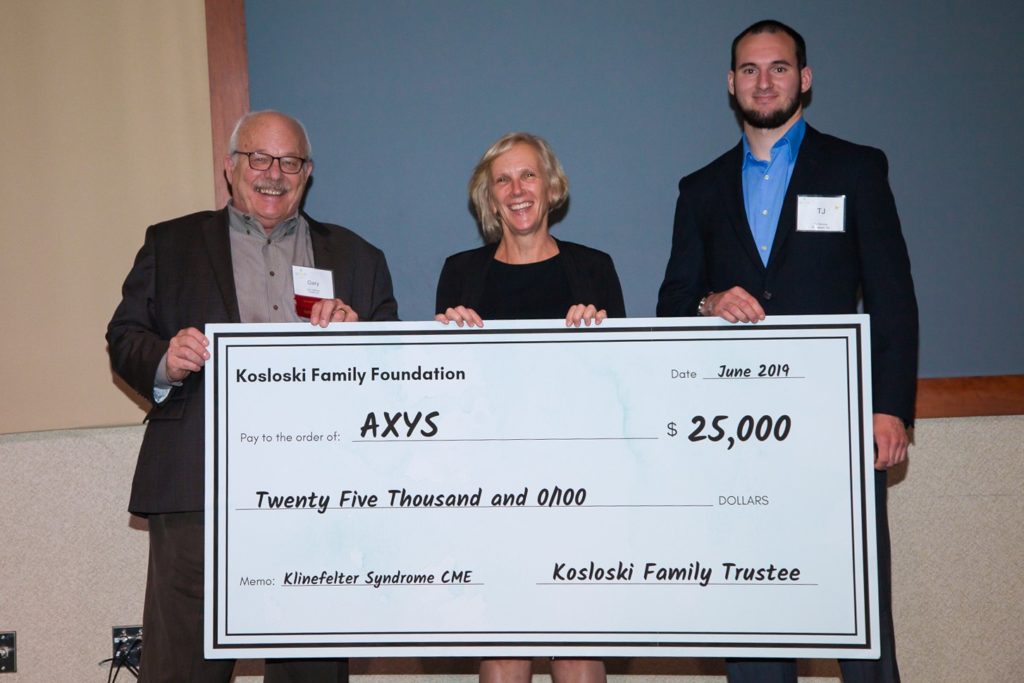June 30, 2019 Atlanta, GA– The Association for X and Y Chromosome Variations (AXYS), dedicated to addressing the needs of those affected by one or more extra X and/or Y chromosomes, was presented a $25,000 check by TJ Torchia, son of Tony Torchia, CPA, Partner at RotenbergMeril, on behalf of the The Kosloski Family Foundation. The generous $25,000 grant will be used to develop an online continuing medical education (CME) course to enhance physician knowledge of 47, XXY, also known as Klinefelter Syndrome (KS).
“For 30 years AXYS has worked to increase access to the multidisciplinary care that those with X and Y variations need throughout their lives,” said Carol Meerschaert, AXYS Executive Director. “This generous grant from the Kosloski Family Foundation will support AXYS’ efforts to enhance physician knowledge of the most common X and/or Y chromosome variation, with the ultimate goal of improving the quality and accessibility of medical care for adults with Klinefelter Syndrome.”
It is estimated that nearly 500,000 individuals in the US have Klinefelter Syndrome. Because of this generous support, AXYS will create a readily accessible online program to educate healthcare professionals on the diagnosis and current standards for treatment with the goal of increasing access to care for those with 47, XXY.
“The Kosloski Family Foundation offers grants for medical education,” said Fotini Allteni, director of the Kosloski Family Foundation. Tony Torchia added, “AXYS provides information and support on Klinefelter Syndrome and it was my pleasure to connect them. My son TJ was thrilled to present this check from The Kosloski Family Foundation to AXYS during their family conference.”
AXYS will work with the members of the AXYS Clinic and Research Consortium (ACRC) to develop the CME program, assuring it will meet the needs of physicians who treat adults with KS.
About AXYS
The Association for X and Y Chromosome Variations (AXYS) is dedicated to addressing the needs of those affected by one or more extra X and/or Y chromosomes. We focus on sharing knowledge, offering support and initiating action to help improve lives of individuals and families. Learn more at genetic.org.
About the Kosloski Family Foundation
The Kosloski Family Foundation was founded in 2018 by the Estate of Helene Kosloski in honor of her beloved family. The Foundation provides support to health and human services institutions, scholarships to universities, and support for the arts.
Helene J. Kosloski was a philanthropist, respected educator and successful businesswoman. She received her Bachelor’s degree from Boston University and began her career working for the Springfield NJ School System, where she retired as principal of the middle school. After retiring, Helene took over the Kosloski family’s real estate business.
Helene made a huge impact in the State of New Jersey through philanthropic efforts to several charitable organizations, including Saint Barnabas Medical Center, The Seeing Eye, Felician University and Rutgers University.
Helene’s mother, Josephine Kosloski, was a lifelong source of inspiration to Helene. Josephine started the family’s successful real estate business setting the examples for Helene of business acumen, values, and leadership. Due to her mother’s example, Helene was able to take over and manage the business successfully and thus create The Kosloski Family Foundation in honor of her mother and family.
About RotenbergMeril
RotenbergMeril is a CPA firm with offices in the NY/NJ Metropolitan Area. According to both the NJBiz Journal and New Jersey Business Magazine, they are ranked as one of the top accounting firms based in Northern New Jersey, servicing clients across the USA and worldwide. The firm is PCAOB registered and a member of both the Center for Public Company Audit Firms, the Employee Benefit Plan Audit Quality Center, and the Forensic Valuation Services (FVS) section of the American Institute of Certified Public Accountants.
RotenbergMeril has a diversified client base of closely-held businesses, emerging public companies, high net worth individuals, trusts and estates, not-for-profits, foundations and Broker Dealers. The firm has a growing roster of emerging and mid-market SEC public companies that are listed on various exchanges, including the NYSE, AMEX and Nasdaq OTC.

